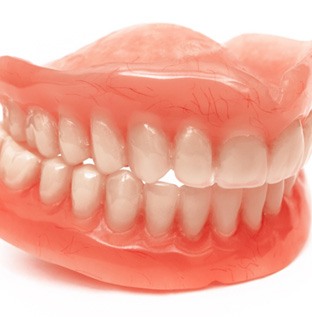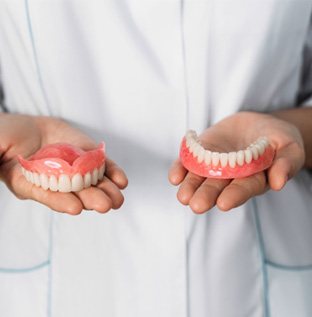Dentures – Kittanning, PA
Reclaim Your Full & Beautiful Smile
Dentures in Kittanning make it possible to replace any number of teeth, meaning it doesn’t matter if you just have a few gaps to fill or an entire missing arch. We can fill in that space with natural-looking teeth that will boost your confidence and allow you to eat and speak normally again. Have you already lost an extensive number of teeth? Are you expecting to have all of your teeth removed in the future? Call Voller Dentistry, PC to schedule an appointment to discuss the possibility of getting dentures from our Kittanning, PA dentist that are made just for you.
Why Choose Voller Dentistry, PC for Dentures?
- Implant Dentures Available
- 100% Custom-Made Prosthetics
- Dentist with 40+ Years of Experience
Who's a Good Candidate for Dentures?

Nearly 41 million Americans wear dentures. Could this tooth replacement solution be a good fit for you as well? That’s a question that you’re likely to find yourself pondering if you have any number of missing teeth. Luckily, you don’t have to figure out the answer on your own; if you schedule an appointment with Dr. Voller and the rest of our dental team, they can examine your mouth and let you know whether you’re a good candidate for dentures.
Effects of Missing Teeth

You may be considering getting dentures if you are missing multiple teeth for any reason. There are several circumstances that can lead to tooth loss, such as physical trauma involving the mouth, advanced forms of gum disease, and severe cavities. No matter what the initial cause was, though, the consequences of missing teeth cannot be ignored.
After losing your teeth, you may find that you look older due to your facial features starting to sag. You may also be unable to eat as many different kinds of foods as you used to, and other people might have difficulty understanding you when you speak. Also, studies have found that there’s a link between tooth loss and depression. In short, losing any number of teeth is a problem that is best solved quickly.
What Qualifies You for Dentures?

Have you experienced significant tooth loss? If you answered “Yes” to that question, then dentures could be a good fit for you. Our team can check your mouth to see if you are currently a good candidate for dentures or if you may need certain preliminary treatments performed first. (For example, any remaining teeth will have to be extracted to make room for full dentures.)
There are different kinds of dentures you may qualify for. We’ll consider whether you should get a partial denture, a full denture, or an implant denture based on your circumstances. Then we will give you our recommendation and explain what the next steps of getting your new prosthesis will involve.
Alternative Tooth-Replacement Options

Dentures have been around for a very long time, and they remain an excellent way to rebuild your smile after tooth loss. However, other tooth-replacement options could potentially be a better fit for your situation. In the event that you are unable to get dentures, we may suggest one of the following alternatives:
- Dental Bridges: If you have only lost one tooth or a few consecutive teeth, you might qualify for a dental bridge. This type of prosthesis is anchored to two of your natural teeth.
- Dental Implants: Implant posts can mimic the functions of your natural tooth roots, which makes them unique among tooth replacement options. You can only have dental implants placed if the jawbone is strong enough to support them. The lifespan of dental implants can vary, but they’re often able to last for more than 30 years.
What Are the Different Types of Dentures?

When discussing your options with Dr. Voller, you can expect him to go over the different types of dentures with you so that you’re aware of which one you’ll be receiving:
Partial Dentures
A partial denture can help replace multiple missing teeth throughout your mouth. It consists of prosthetic teeth attached to a gum-colored base and fits with your remaining teeth like a puzzle piece. It is typically held in place using clasps and can be easily removed for cleaning.
Full Dentures
For a person missing an entire row of teeth, a full denture can give them their smile back. In this case, the denture would sit directly on the gums.
Implant Dentures
Dental implants are small titanium posts anchored into the jawbone. If you prefer a secure full or partial denture, you should consider implant-supported dentures. In a brief surgery, an implant dentist can secure a few dental implant posts to hold your dentures in place. With implant-supported dentures, you won't have to worry about slippage, and your prosthetic will feel safe and sound.
How Dentures are Made

After narrowing down the type of denture that is right for you, the next step is to have your prosthesis made. Every denture is carefully personalized in order to provide the patient with a comfortable fit and a beautiful appearance. It’s natural to want to learn more about the process through which your new teeth will be made, so check below to learn more about the materials and steps involved in creating reliable new dentures.
What are Dentures Made Of?

The base of the denture can potentially consist of many different materials, but many dentists favor acrylic. There are several advantages to using acrylic; not only does it closely match the appearance of the gums, but it’s also relatively easy to repair. If you get a partial denture, the base may include clasps made out of metal.
As for the artificial teeth of the denture, resin and porcelain are both potential options. Porcelain is typically chosen for its durability as well as its highly natural appearance. That said, it is also somewhat abrasive, so it tends to be a better choice for full dentures than partial dentures.
The Denture Creation Process

Before anything else, impressions of your gums need to be captured. We will then create a model of your mouth that will be sent to a dental laboratory. The technicians at the lab will carefully examine the model and take note of what size and shape the denture will need to be.
Using the provided model as a guide, the technicians will then make a replica of your gum line out of wax. Then the artificial teeth will be inserted into their proper spots. The wax may have to be slightly reshaped to ensure that it resembles your gums as much as possible.
The denture in its current form will be sent to our office. We’ll schedule an appointment with you so that you can try them on. Our goal will be to confirm that the denture fits before returning it to the laboratory so that the process can continue.
Next, the wax portions of the denture need to be replaced with an acrylic base. This is accomplished by melting the wax away with hot water. To make sure that the denture maintains the proper shape during this stage of the process, it will be put in a special flask, which will be filled with plaster. Acrylic is then injected into the flask. A liquid separator helps ensure that the acrylic does not stick to the plaster.
The denture will be carefully taken out of the flask. Then, after leftover plaster has been removed, the prosthesis will be trimmed and polished. At that point, it will be ready to be sent back to our office so that we can schedule one final fitting appointment. Once we’re sure that your denture fits as it should, you can start reaping the benefits of your new teeth.
Adjusting to Your New Dentures

Don’t be alarmed if your denture causes a bit of soreness or makes it difficult to eat or speak at first. This is simply part of the process of your mouth adjusting to the prosthesis. Our team can give you tips for making sure the adjustment process goes as quickly and smoothly as possible.
Benefits of Dentures

There are immense benefits that come with dentures. These time-tested prosthetics are known to build smiles with a more natural look and stable foundation, but that’s not the only positive aspect of this treatment. Here are just some of the most prominent benefits that you can experience when you replace your missing teeth with dentures.
Psychological Benefits

People who don’t have teeth often have difficulty accepting their tooth loss. This can cause one to stop engaging in social activities, ultimately leading to a higher risk of sadness and depression. By restoring the appearance and function of one’s smile with dentures, patients are likely to experience increased confidence and self-esteem when speaking, eating, and engaging socially!
Clearer Enunciation

It is much more difficult to speak clearly when you don’t have any teeth. This is because without being able to touch your tongue to your teeth, certain sounds are nearly impossible to make. Since dentures act as your missing teeth, they allow wearers to enunciate more clearly while speaking. After a little bit of practice and a short adjustment period, speaking with come naturally.
Improves Nutrition

Foods that are tough in texture, like many veggies, fruits, and healthy proteins, are very difficult to consume when you don’t have a reliable set of teeth. This can lead to indigestion and malnutrition. With an improved ability to chew, dentures allow for a more expansive diet full of nutritious foods and veggies. Ultimately, dentures can help you to receive the essential nutrients you need to thrive.
Preserves Oral Health

If you have some remaining natural teeth, dentures can help to keep them from shifting around to other areas of your mouth. Dentures also bear some of the weight of regular chewing, reducing the wear and tear of your existing teeth.
Expands Opportunity

Did you know that according to a 2019 study, the probability of being employed was negatively associated with poor health? Your smile is one of the first things people notice about you, so when it comes to making first impressions, having a complete, healthy-looking smile will do nothing but help others see your other amazing characteristics.
Understanding the Cost of Dentures

Receiving prosthetics to replace your missing teeth takes time and money. While many people don’t mind the time, it’s often the money that keeps them from pursuing lifelong treatment. What exactly is the cost of dentures in Kittanning? The only way to find out is to schedule a consultation with Dr. Voller. From the type of denture you need to the complexity of how it will be created, various factors are considered when drafting your cost estimate.
Factors That Affect the Cost of Dentures

Your denture dentist in Kittanning will meet with you during your consultation to go over your oral and overall health as well as the density of your jawbone. After compiling his findings, you can expect him to factor in these variables to formulate the cost:
- How many teeth you are missing and if a partial, full, or implant denture is necessary.
- Do you need preliminary treatments to better prepare your mouth for dentures (i.e., bone grafting, periodontal therapy, tooth extraction)?
- The materials lab technicians will use to craft your dentures (i.e., acrylic or porcelain).
While there are dentists who offer cheaper materials and solutions, you run the risk of receiving a cheaply made prosthetic that will not hold up to daily wear and tear. This is why Dr. Voller will explain his reasoning for using higher-quality materials and why it’s a more worthwhile investment.
Are Implant Dentures More Expensive?

Implant dentures are considered the gold standard, which means they can do what no one other tooth replacement can – restore the full root-to-crown structure. As a result, they are more expensive because they must be surgically implanted into the jawbone. However, the investment made is worth it because of the stability, functionality, and longevity patients receive. Instead of requiring an adjustment or replacement every 10 years or so, you can move forward with a smile that can last between 30 years or even a lifetime.
Does Dental Insurance Cover Dentures?

Dentures in Kittanning are typically covered by dental insurance. Each plan is different, so you’ll need to review your policy before making a formal decision. However, our team is here to help you navigate your plan so that you pay the least out of pocket. If your policy is like most others, there’s a possibility that your insurer will cover up to 50% of the total cost, but you must have met your deductible and there must be plenty of funds left in your annual maximum.
Other Options for Making Dentures Affordable

Dr. Voller understands that prosthetics can be costly and not everyone has dental insurance. To assist in helping those who are uninsured or need additional assistance to keep from paying high out-of-pocket costs, he is pleased to offer:
- The Voller Value Plan – This only requires one, low annual enrollment fee, and you receive access to routine checkups and cleanings for the year as well as 20% off on various restorative and cosmetic services.
- Flexible Financing – Through CareCredit, you can apply for a plan that is of low or no interest, allowing you to easily break up the cost of your care and better manage your budget. Instead of paying the entirety up front, you can pay it off in monthly installments.
Dentures Aftercare

Dentures can be truly life-changing, transforming your once incomplete and non-functional smile into one that you feel proud and confident in. After investing so much of your hope, time, and finances into restoring your grin, you’ll want to take extra precautions and excellent care of them to extend your denture’s lifespan. Dr. Voller and our helpful team are always happy to provide you with tips, tricks, and advice on how to make that happen.
Removable Dentures
Take Your Dentures Out After Eating
Dentures will help you eat with greater ease, but after you finish a meal or snack, removing them to give your gums a rest and rinsing them can help keep them looking like new. It will also prevent the build-up of food debris and plaque in your mouth, which can lead to other oral health concerns. Be sure to rinse them using only room temperature or cool water, as hot water will cause the material to warp and affect their fit.
Clean Your Dentures Regularly
In addition to rinsing your dentures after eating, you’ll also want to clean them more thoroughly at least once a day. This will ensure that harmful oral bacteria aren’t given the chance to overrun your smile and cause infections and other issues to arise.
When cleaning your dentures, you’ll want to use the right instruments. Never use a hard-bristled toothbrush, as this could scratch the surface of your prosthetic. Instead, use a special denture-cleaning brush or soft-bristled toothbrush. For the same reason, you’ll want to avoid toothpaste, being sure to only use denture cleaning solution. At night, you can also soak them in a specially formulated cleanser to keep them from smelling and keep them clean.
Always Store Your Dentures in a Safe Place
Whenever your dentures aren’t in your mouth, you’ll want to make sure they’re out of reach of any pets, children, or accidentally being knocked off a countertop. Dentures are costly, and we want to make sure that yours last as long as possible! While you’re sleeping, soak them in a glass of room temperature water on a high shelf away from any hustle and bustle. If you have partial dentures, be sure to store them in their hard protective case.
Take Your Dentures Out Before Sleeping
Even though you may be tempted to sleep with your dentures in your mouth, the only time that this is recommended is typically during the first 24 hours of wearing them. Otherwise, it’s important to allow your gums to rest and make sure your gum circulation isn’t restricted. If you don’t, you may notice inflammation and irritation occur, making it uncomfortable to wear your prosthetics. Additionally, overnight use of your dentures can lead to an increased risk of pneumonia due to bacteria accumulation.
Notice Any Changes
Dentures are highly durable, but over years of wearing them, you’ll likely notice changes in their fit due to your oral structure changing. Keep an eye out for accidental damage, like chips or cracks, as well as oral signs like irritation and inflammation. These will let you know when it’s time to either have your dentures relined or replaced.
Dentures FAQs

If you are preparing for life with dentures in Kittanning, you’re making an excellent choice. Not only will you enjoy greater functionality, but you’ll also feel more confident when surrounded by your peers. But before the process of receiving your new teeth begins, we encourage our patients to create a list of questions and bring them to their appointment. This allows us to offer clear and concise answers as well as eliminate any uncertainty you might have regarding your new and improved smile. To help you get started, we’ve compiled the answers below to some of the most common questions asked by our patients. Feel free to review and contact us when you’re ready to schedule an appointment.
How long will you have to wait to get dentures after your teeth are pulled?
If you must have any teeth pulled before receiving customized dentures, it’s typical to have to wait anywhere from 6-8 weeks. Depending on the type of denture you receive, this timeframe can be shorter or longer. What is important is that your mouth heals thoroughly before moving forward with denture placement. Not only do your gums need to heal from surgery, but they must be ready for dentures to fit properly.
If receiving immediate (same-day dentures), it is possible you can have these placed the same day as your extraction, allowing you to eat and speak immediately following your surgery. The downside to this is that your dentist will not have the opportunity to preview the fit or check the shape of the underlying bone to ensure it will not change as the mouth heals (as it likely does).
If implant dentures are what you’re preparing for, you’ll need to wait 4-6 months to allow the implants to fuse with the bone before receiving your customized denture.
Can I sleep with my dentures?
Although you can, you shouldn’t. Dentists recommend that you remove your denture before going to bed for three reasons:
- Your gums need to recover and receive valuable nutrients throughout the night
- Bacteria can develop underneath the denture, increasing the risk of pneumonia when sleeping in them
- Wearing dentures at night restricts gum circulation, which can cause irritation and ridge resorption
It’s always best to take them out before going to bed and allow them to soak overnight.
Will it hurt to get dentures?
If you undergo a tooth extraction, you’ll likely experience some soreness and discomfort following oral surgery; however, once you begin taking your pain medication, this should dissipate within 3-5 days. Once your dentures are in place, though, don’t be surprised if some soreness returns, as your soft oral tissues must adjust to this new fixture inside your mouth.
The adjustment phase will differ between patients, and it can sometimes take months before a person feels “normal” with their dentures in. You may also notice if you switch your dentures or have them adjusted, there may be some soreness.
If the pain does not dissipate after a few days, you should plan to call your denture dentist in Kittanning right away. It may be that your dentures do not fit properly or there is a more serious issue that must be addressed.
What can’t you eat with dentures?
Although you do have greater bite force with dentures as opposed to having no teeth, there are some foods you should stay away from, such as:
- Sticky foods like peanut butter and gummy candies, as these can pull your dentures out of your mouth. Also, these food particles can become trapped underneath your dentures, increasing your risk of gum disease.
- Smaller foods like kernels, sesame seeds, and shelled nuts, as they can become trapped beneath your dentures.
- Hard foods like corn on the cob, apples, carrots, or nuts, as they can damage your dentures.
- Tough meat (i.e., steak) because of the difficulty that can come with chewing these types of food.
I Need a Checkup & Cleaning I Need a Dentist for My Child I am Worried About Gum Disease I Have a Cavity or Broken Tooth I am Missing One or More Teeth I Want to Enhance My Smile I Want a Straighter Smile I Want to Learn About Sleep Apnea I am Scared of the Dentist I Have Pain in My Jaw View Our Services
